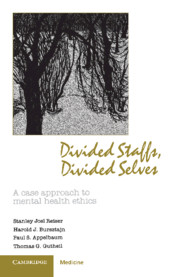Book contents
- Frontmatter
- Contents
- Acknowledgments
- About the authors
- 1 Introduction
- 2 New problems, new ethics: challenging the value structure of health care
- 3 Conflict and synthesis: the comparative anatomy of ethical and clinical decision making
- 4 Solving clinical puzzles: strategies for organizing mental health ethics rounds
- CASES IN MENTAL HEALTH ETHICS
- I Informed consent, competency, and involuntary treatment
- II Confidentiality
- III Truth-telling
- IV Managing difficult patients
- V Parents and children
- VI Religion and mental health treatment
- VII Allocation of resources
- VIII Research
- IX Mental health and medical illness
- X Mental health and criminal justice
- Bibliography
- Index
V - Parents and children
from CASES IN MENTAL HEALTH ETHICS
Published online by Cambridge University Press: 06 July 2010
- Frontmatter
- Contents
- Acknowledgments
- About the authors
- 1 Introduction
- 2 New problems, new ethics: challenging the value structure of health care
- 3 Conflict and synthesis: the comparative anatomy of ethical and clinical decision making
- 4 Solving clinical puzzles: strategies for organizing mental health ethics rounds
- CASES IN MENTAL HEALTH ETHICS
- I Informed consent, competency, and involuntary treatment
- II Confidentiality
- III Truth-telling
- IV Managing difficult patients
- V Parents and children
- VI Religion and mental health treatment
- VII Allocation of resources
- VIII Research
- IX Mental health and medical illness
- X Mental health and criminal justice
- Bibliography
- Index
Summary
PROTECTING CHILDREN
When is it appropriate for therapists to override parental wishes?
A 9-year-old girl was admitted to the Children's Psychiatric Unit with a history of multiple somatic complaints, refusal to go to school, and in the past year, although not currently, a history of such minor self-abuse as inflicting scratches on herself. The patient evidently had been having trouble for some time, but only recently had the parents agreed to bring her in for psychiatric evaluation. When she does attend school, she does well. She has a 6-year-old sibling who, according to the clinicians in the Children's Unit, has attempted suicide recently, certainly an unusual occurrence in a child that young. In addition, it is reported that prior to admission the patient was sleeping up to 17 hours a day.
Five days after admission the patient's mother called, saying that she intended to take the patient home with her that afternoon. The clinicians at the Children's Unit do not view this family sympathetically. The father was described as withdrawn and anxious, and the mother as anxious with pressured speech. The ostensible reason for their wanting to take the child out of care was that the child's grandmother had just been hospitalized for a bleeding ulcer, and the family wanted to have her back home so that they would not worry about her as well. The clinicians thought that perhaps the real reason they wanted her at home was to care for her younger brother while the mother was off tending to grandmother.
- Type
- Chapter
- Information
- Divided Staffs, Divided SelvesA Case Approach to Mental Health Ethics, pp. 95 - 102Publisher: Cambridge University PressPrint publication year: 1987



